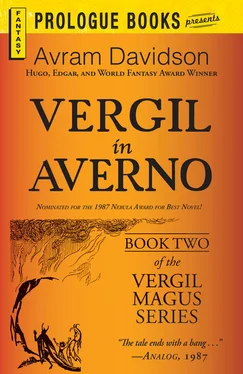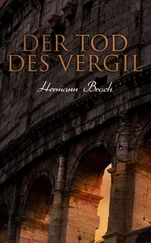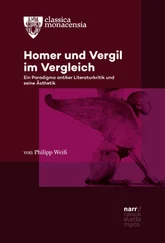Avram Davidson - Vergil in Averno
Здесь есть возможность читать онлайн «Avram Davidson - Vergil in Averno» весь текст электронной книги совершенно бесплатно (целиком полную версию без сокращений). В некоторых случаях можно слушать аудио, скачать через торрент в формате fb2 и присутствует краткое содержание. Жанр: Фэнтези, на английском языке. Описание произведения, (предисловие) а так же отзывы посетителей доступны на портале библиотеки ЛибКат.
- Название:Vergil in Averno
- Автор:
- Жанр:
- Год:неизвестен
- ISBN:нет данных
- Рейтинг книги:3 / 5. Голосов: 1
-
Избранное:Добавить в избранное
- Отзывы:
-
Ваша оценка:
- 60
- 1
- 2
- 3
- 4
- 5
Vergil in Averno: краткое содержание, описание и аннотация
Предлагаем к чтению аннотацию, описание, краткое содержание или предисловие (зависит от того, что написал сам автор книги «Vergil in Averno»). Если вы не нашли необходимую информацию о книге — напишите в комментариях, мы постараемся отыскать её.
Vergil in Averno — читать онлайн бесплатно полную книгу (весь текст) целиком
Ниже представлен текст книги, разбитый по страницам. Система сохранения места последней прочитанной страницы, позволяет с удобством читать онлайн бесплатно книгу «Vergil in Averno», без необходимости каждый раз заново искать на чём Вы остановились. Поставьте закладку, и сможете в любой момент перейти на страницу, на которой закончили чтение.
Интервал:
Закладка:
Clutching fast the cross-spar, the man peered round about. Then he ceased to move his head, looked steadily toward Averno. Then he gave a cry, lurched. “Turno!” his mates called. “Turno, what see thee?”
“I be giddy; bring me down!”
Someone murmured, near to Vergil, “Bring him down, then; slowly, steady, bring him down, so.”
On the ground, as they undid his harness, the man, pale, staggered, fell into a comrade’s arms, was gently laid upon the ground. “Turno, what thee did see, soldier? Tell us, man.”
“I saw blood and fire and someone. . more than one. . transfixed by an arrow. . I be giddy, bring me down. Bring me down, mates.” There was a brief convulsion. Turno became incontinent. There was a call for warm water, clean rags, a clean tunic. And, while one man went to get these, at once the others began to dismantle the jury-rigged mast. The soldiery was seldom idle.
One of them, the youngest it would seem, asked, as he grunted and tugged at the bolts, “If he did see ‘Verno indeed, how dids he see an one man and one arrow? For it be greatly far.” Someone, someone older, said something, low, to the lad, and the lad said nothing more.
But someone else had something more to say. “Raven. . raven. . I speak nothing of this here man and that there rank, but as merely of the bird, the raven-bird, it power of sight, it power — I say — be far, but I questions, be it clear? For this sight ‘tis due alone to the dread diet of the raven: for the raven eateth naught but dead men eyes.”
Another: “Quiet, lest thee fright the lad; he will learn them thing soon enough. In the lodge, or out.”
To Turno, he having been swiftly, gently, washed, and hastened into a clean tunic: “What else did thee see, man? Did thee see other soldier coming, mate?”
From Turno: “I be giddy. Bring me down.”
Casca crouched in his curule chair, listening to Vergil’s report of what had just happened. The Legate muttered something; as Vergil leaned toward him, cupping an ear, Casca, with an effort, cleared his throat, spoke again. “Seven kings select the Emperor,” he said. “Yet, if all eight were here now, it could not affect what might be happening, there.” He gestured in the general direction of the Very Rich City. Then, slowly, he straightened his slack back, began, slowly, waving aside a gesture of assistance, to rise.
“In general,” he said, “I consider the teachings of Zeno not adequate as a basic principle of rule. Still. . there is the fundamental Stoic saying: There are things which may be helped and there are things which may not be helped, and one must learn which are which. It is close in here, and it may be less close outside. Let us see.”
Scarcely had they moved outside and settled their seats when the soldiery, who had been working in the far end of the walled yard, gave one great wordless cry; Vergil at that moment thought it must be one of those shouts such as men, soldiers or not — workmen, for example — use when they bend themselves to a sudden effort. No. Casca clutched at the bosom of his garment, half-rose from his seat, fell back, and, with his quivering hand, pointed.
Vergil jerked his head around. There, behind, beyond the fortress wall, a huge. . something . . like a red-hot lance-head. . towered and trembled, high against the sky.
“Vesuvio!”
“No! Not — ”
The earth gave a shivering movement.
“Then what?”
The chairs, as though of their own motion, or as though moved by men invisible, began to slide. Even one slight second before this, Vergil had begun to shout his answer, was still shouting it even when the chairs were flung against the wall (wall which quivered but, marvelously, did not fall), even while the last elements of his cry were swallowed up by some other sound. As though every lion in every arena had roared at once. Fell silent. Roared again. Fell silent. Roared again. Fell silent.
In this last silence he heard the silent echo of his voice still crying answer within his mind.
Vesuvio?
Averno.
As when some great ship be found wracked ashore, evidence of what befell her may be deduced from such details as: Were her timbers scorched? Were they stove? Was her cargo jettisoned as though to lighten the vessel lest she stoop beneath a storm, or was her cargo found intact within her sand-filled hold? Such bodies as lay strewn upon the strand, were they but drowned or did they bear wounds? Was her apparel all in place or had her sails been stowed….
But as for Averno, there were no witnesses — certes, none who ever did come forward — to tell of her very last hours. The testimony of those who had fled early, of those who had seen the preparations, the testimony of the intentions of the magnates as writ in hard black ink, and such testimony as that provided by the soldier of Raven rank (was it clear-seeing, clairvoyance of something then going on though past possible sight by normal vision? Was it prophecy? Was it. . whate’er it was) — these, bit by bit, and word by word, built up a certain scene.
There were no witnesses to tell of the last hours of Averno, of who had gone first to the slaughter, who second. . and who last. Cadmus, no doubt, they had saved till last. It would have been their way, the way of the magnates to have done so. As to how others had gone to death, the ways no doubt must have been various: some screaming and flailing, some praying, some cursing, some in Stoic acceptance and in Stoic silence. And Cadmus? What had his Sibyl said? Cadmus was a mart, therefore Cadmus was mortal. Which is but to say that water wets and fire burns. If they had not bound his feet, and who knows if they had or had not, Cadmus had doubtless gone dancing; if they had not gagged his mouth, and who knew if they had not or had, Cadmus had likely gone singing. This perhaps mattered not much (though much, perhaps, it had mattered to Cadmus). One thing mattered much. . to Vergil. Mostly Cadmus had been mad, sometimes he had been sane. Vergil, knowing that he would never know, Vergil hoped with all his heart that Cadmus had not, then, been sane.
I see Cadmus, transfixed by an arrow: thus the vatic message. Vergil, a hundred years (so it seemed) after, was to ask himself, How had he kenned this soothsaying, at the time that first he heard it? Beneath the rose. . Images of possible meaning had flashed across his mind like bolts of lightning, new one succeeding before old one had left off; as (1) literally: an archer shall let loose an arrow from a bow and it shall pierce Cadmus’s body — (2) metaphorically: arrows are symbolic of many things, as one speaks of the arrow of Eros, perhaps Cadmus in love — (3) allegorically: mayhap some stroke of state or fate shall bring his “reign” to sudden end —
But the vision might have been a Sibylline saying or a Delphic oracle for all that any tincture or impression of the truth had entered Vergil’s mind. How had one such story gone? the Emperor Marius sent the customary rich gifts to Delphi, asking, When shall I die? And the Pythonessa, sitting cross-legged in her shallow, fireless caldron on its tripod, had drooled and babbled and then, head jerking upright, clearly cried, Beware the sixty-third year! The sixty-third year, beware! Scarcely had Marius, then in the full flush of his maturity, finished chuckling — half-scornful, half-elated — when he had, in his royal tent, fallen, dozing, then sleeping; see him awaken to find himself alone and the tent alone, legions having, one after the other, in the night silently struck their own tents and vanished. To the one faithful servant who remained, Marius cried out asking whither had his armies fled, and why? The servant, loyal indeed but neither perceptive nor sharp, groping after any crumb of comfort, answering: They have gone to join General Sulla, who has proclaimed rebellion; but, sure your Imperial Highness need not fear that Sulla: he is old, he is old, he is sixty-two years old!
Читать дальшеИнтервал:
Закладка:
Похожие книги на «Vergil in Averno»
Представляем Вашему вниманию похожие книги на «Vergil in Averno» списком для выбора. Мы отобрали схожую по названию и смыслу литературу в надежде предоставить читателям больше вариантов отыскать новые, интересные, ещё непрочитанные произведения.
Обсуждение, отзывы о книге «Vergil in Averno» и просто собственные мнения читателей. Оставьте ваши комментарии, напишите, что Вы думаете о произведении, его смысле или главных героях. Укажите что конкретно понравилось, а что нет, и почему Вы так считаете.












